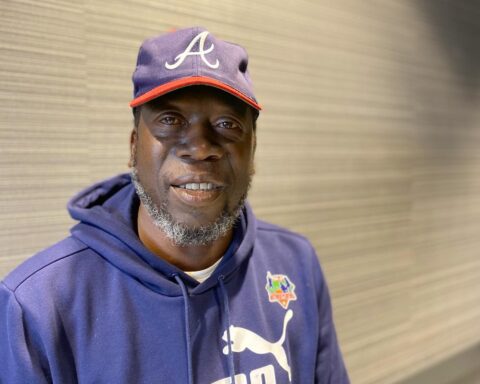How far should Georgia go to curb the spread of coronavirus while also protecting the economy from collapse?
It’s a question state and local leaders are grappling with as COVID-19 continues sickening Georgians at a rapid pace and has led to nearly three dozen deaths as of noon Tuesday.
Many officials and observers worry executive orders Gov. Brian Kemp issued this week may not go far enough to slow the virus’s transmission rate. Others say leaders across the country are left with few options due to the small number of tests that have been conducted so far.
Kemp issued an executive order Monday requiring the state’s most vulnerable populations – people 60 years of age and older and those with chronic health issues – to remain indoors and isolated through midday April 6. He also imposed a statewide ban on bars, nightclubs and gatherings of 10 or more people unless it can be guaranteed people will stay six feet apart from each other.
His order was quickly followed by a separate announcement from Atlanta Mayor Keisha Lance Bottoms, who imposed a 14-day stay-at-home order for all city residents Monday night. Savannah followed suit Tuesday with a mandatory stay-at-home order effective through April 8.
On Tuesday, the Georgia Municipal Association pressed officials in Georgia’s 538 cities to approve stricter limits on public gatherings and businesses than Kemp’s order requires, including mandatory nightly curfews.
“Local leaders recognize that the potential harm to our state’s economy, our health-care workers and first responders, and to our most vulnerable is far greater if stringent measures aren’t put in place across the state to slow the spread of the virus,” said Dublin Mayor Phil Best, who is also the municipal association’s president.
In a radio interview Tuesday, Kemp said he did not think more restrictive measures were needed yet since Georgia’s confirmed coronavirus cases have not risen to the same degree as other states like New York. He said he supports the decisions by local leaders like Bottoms to set their own rules.
“I’m keeping my fingers crossed but we’re doing relatively well here in the state of Georgia,” Kemp said. “And I feel like we’re doing the right things at the right time to stay ahead of the curve.”
Many health professionals have urged the governor to take more drastic steps, such as Emory University’s vaccine czar, Dr. Carlos del Rio, who took to Twitter Monday night to call on the governor “to continue moving and to do it quickly.”
“There is not time to lose as COVID-19 advances quickly and relentlessly across the state,” said del Rio, who chairs the Hubert Department of Global Health at Emory’s Rollins School of Public Health.
Others have said their hospitals and medical staffs will keep their noses to the grindstone regardless of what social restrictions federal, state and local officials impose.
“We know that the best way to stop the spread of the disease is for people to stay at home, especially if they are sick,” said Dr. Stephen Thacker, associate chief medical officer at Memorial Health University Medical Center in Savannah. “People can do that now, without a mandate.”
Meanwhile, other experts and officials agree Kemp and his counterparts across the country have been caught between a rock and a hard place without more comprehensive data from testing.
Former U.S. Sen. Sam Nunn of Georgia, who participated in pandemic simulations during the 2000s and founded the nonprofit Nuclear Threat Initiative, called the lengthy turnaround of several days for test results “totally unacceptable.”
The federal government must take the lead on boosting available test kits and distributing them in far larger volumes so that local public health agencies can keep better track of where exactly the virus is spreading, Nunn said.
“To really get people back to work safely, you’re going to have to have millions and millions of tests,” Nunn said. “Until you do that, you’ve got this dilemma of strangling the economy by strangling the virus.”
Nearly 5,500 diagnostic tests have been completed in Georgia since the state ramped up its own testing capabilities and brought on private labs to pitch in starting earlier this month. Through noon Monday, 1,026 people had tested positive for COVID-19 in the state and 32 people have died.
Beyond curfews and isolation orders, state and local officials also need to temporarily ignore political jurisdictions so that hospitals can serve as many people in a given area as possible, said Grace Bagwell Adams, an associate professor of health policy and management at the University of Georgia.
Tighter coordination between local governments and hospitals would help spread out the treatment burden among multiple hospitals and keep people from having to travel long distances to receive medical care, particularly in rural areas, Adams said.
“There’s so much variation across our state in terms of access to health care,” Adams said. “Many individuals are driving well over an hour not just to get to a hospital, but to a physician.”
Already, epidemiologists across the world are predicting areas could see a second outbreak of coronavirus late in the year once the current wave slows down this summer, said Dr. Isaac Fung, an associate professor of epidemiology at Georgia Southern University’s Jiann-Ping Hsu College of Public Health.
Fung pointed to new measures being taken in India, which is poised to begin a 21-day lockdown for all 1.3 billion of the country’s residents starting at midnight Wednesday. He said the less restrictive approach in Georgia should slow down the virus, but it will not “break the chain of transmission.”
“I think right now in the entire country, including Georgia, people are not psychologically prepared for a lockdown,” Fung said. “People ask me, ‘Can life go back to normal in two to four weeks?’ My answer is, ‘No.’ ”
Disclosure: This article may contain affiliate links, meaning we could earn a commission if you make a purchase through these links.






